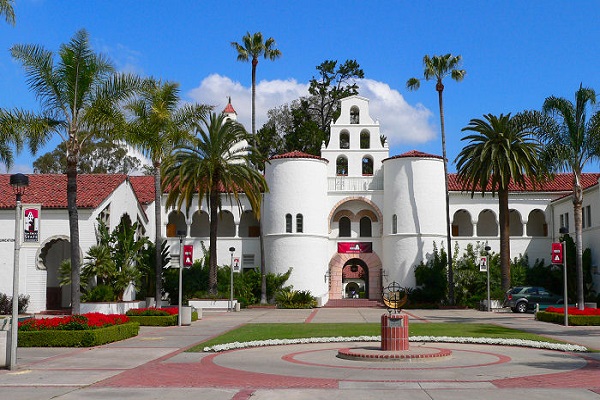San Diego State University: Presidential Visit to Palau Highlights SDSU’s Global Impact
Having a university president sit in on your master’s program presentation is heady stuff.
Especially when the president traveled over 7,000 miles of open ocean just to be there.
In mid-October, Adela de la Torre became the first San Diego State University president to pay a visit to the university’s longstanding, but little-known bachelor’s and master’s degree programs in the Republic of Palau, an island nation in the Western Pacific.
On the first evening after arriving, the delegation of SDSU leaders, which included associate vice president for international affairs Cristina Alfaro, Interwork Institute director Caren Sax and Theresa Lally, director of Interwork’s Center for Pacific Studies, observed seven groups of students as they made final presentations for their master’s program projects — their final hurdle before graduation in May.
“Everyone in the cohort had been hearing about the coming of the president of SDSU to Palau, so they were excited,” said master’s student Hedrick Kual, who is also dean of continuing education at Palau Community College (PCC). “However, when we all learned that she will sit in on the presentations, everybody got nervous. For my group — and very true for myself — it felt like a rite of passage, earning our Aztec stripes in front of President de la Torre.”
Consider it a rite of passage passed.
“I was so proud to see our Palauan students putting what they’d learned into action,” de la Torre said. “Everything I experienced during the visit exemplified SDSU’s global impact. It made clear the importance of empowering local leaders and the creators of change in addressing the social and environmental issues that face this community. The wonderful people I met–many of them SDSU alumni–are creating a better future for Palau, steeped in culture and history.”
Empowering leaders and educators is exactly what SDSU’s programs in Palau have done for the better part of two decades.
Prior to the program, Palauans seeking a bachelor’s degree would have to leave the island, a fact that created the conditions for “brain drain” emigration.
Trusting Partnership
SDSU, via the Interwork Institute, helped fill the void in 2005, inking an agreement with the community college. The new bachelor’s program. “Interdisciplinary Studies in Three Departments,” or IS3D, allows students to create a degree plan by melding three different programs into a unified theme. A master’s program in postsecondary education leadership, which now offers select courses in public administration, was launched the following year.
“The idea was that we could deliver these degrees to help them reach their vision,” said Sax, a professor emeritus who has visited the country more than seven times to teach. “It wasn’t a case of, ‘Here we are, this is what we think you should do. But what do you want to do and how can we help you get there?’
“That’s always been the relationship and I think that’s served everybody well. There’s a lot of trust and they really value the program.”
Student Success
SDSU faculty, primarily from the College of Education, teach in Palau for one week at the beginning of each class. The students then meet together weekly with activities and discussions led by an on-island facilitator. There is also an online learning component, which increased during the COVID-19 pandemic — though finding appropriate class times given the 16-hour time difference can be a struggle.
In all, the bachelor’s program — comprising 52 units after transferring from PCC — takes 3 ½ years to complete. The master’s program takes two years.
And the Palauan students overwhelmingly finish. Sax noted that in the most recent cohort, 28 of 30 students graduated, with two students dropping out because of health issues. The bachelor’s program was a perfect 29-for-29.
“The people who have been in our program, they’re working, they have families and they’re committed to being there,” Sax said. “Palau will fund young folks to go off island to get degrees, but getting them to come back and stay is another question. That’s a big concern because the population is so small. But all the people that take our program, they’re there, they’re working and they’re invested in the future of their country.”
SDSU now has more than 250 graduates in Palau, a huge number in a country of about 18,000. Three of the 29 members of the Palau National Congress — two delegates and one senator — are alumni. De la Torre had a chance to meet the two delegates, Frutoso “Toto” Tellei and Yutaka Gibbons, Jr.
The program, Sax added, has proven mutually beneficial for SDSU faculty, who have had the opportunity to advance their research while learning about — and adapting their teaching to — Palauan culture.
The SDSU delegation also met with PCC president Patrick Tellei as well as U.S. Embassy officials.
“At SDSU International Affairs, we are committed to expanding global equity in education through high-impact and quality programs designed to prepare a new generation of globally-conscious educators and leaders,” Alfaro said. “Our work in Palau is a perfect example of how international diplomacy and the development of trusting relationships and collaborations can increase our capacity to export stellar SDSU graduates and ambassadors.”

